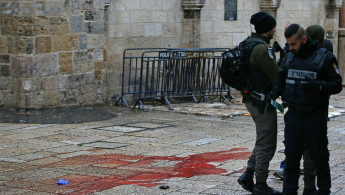Israeli officials employing 'shoot-to-kill' policy on Palestinians: HRW
The watchdog based its claim on an analysis of statements by Israeli officials compiled since October 2015.
"It's not just about potentially rogue soldiers, but also about senior Israeli officials who publicly tell security forces to unlawfully shoot-to-kill," said Sari Bashi, Israel advocacy director at Human Rights Watch.
"Whatever the results of trials of individual soldiers, the Israeli government should issue clear directives to use force only in accordance with international law".
The statements documented by HRW include those of senior Israeli politicians, including the police and defence minister, which call on police to shoot and kill suspects regardless of whether lethal force is necessary to protect others.
 |
The statements documented by HRW include those of senior Israeli politicians, including the police and defence minister, which call on police to shoot and kill suspects regardless of whether lethal force is necessary to protect others |  |
According to international human rights law, shooting to kill is limited to circumstances in which it is strictly necessary to protect life. Israeli open fire regulations, however, do not note this limitation, but do limit shooting at the torso or head to situations in which a threat is imminent.
HRW cites a number of different cases where Israeli officials have called for the use of lethal force, or indeed failed to condemn its excessive use.
One instance cited is that following a stabbing attack in which two Israeli civilians were injured in October 2015 in West Jerusalem. The alleged teenage Palestinian assailant was killed when police arrived.
Reporters were later told by Jerusalem Police District Commander Moshe Edri that those who carry out attacks would be killed, without condition.
"The police are doing their job and arriving quickly," Edri explained.
"Within less than a minute and a half, the attacker had already been killed. Everyone who stabs Jews or harms innocent people – should be killed".
 |
Everyone who stabs Jews or harms innocent people – should be killed - Jerusalem Police District Commander Moshe Edri |
 |
In October 2015, Israeli Police Minister Gilad Erdan appeared to support the shoot-to-kill tactic during a radio interview.
When asked by the interviewer if he agreed with an opposition party lawmaker who said that "if a terrorist has a knife or screwdriver in his hand, you should shoot-to-kill him without thinking twice," the minister responded strongly in support.
"Definitely," Erdan said, "The question of course depends on the circumstances. There are clear instructions to the Israeli police. As soon as a police officer feels danger to himself or any other citizen, he needs to shoot according to the regulations. It's clear. We don't want to endanger any citizen or police officer. And also, every attacker who sets out to inflict harm should know that he will likely not survive the attack".
Since October 2015, there have been over 150 cases in which security forces have fatally shot Palestinian adults and children suspected of trying to stab Israelis.
According to HRW, video footage and witness statements relating to many of these instances "raise serious questions about the necessity of the use of lethal force".
After analysing video footage and forensic evidence, rights groups Amnesty International, Al-Haq and a coalition of nine Israeli groups have called on Israel to rein in the excessive use of force.
The groups say that Israeli security forces have used excessive force where no imminent threat was posed by the suspect, as well as in cases where the suspect may not have committed a crime at all.





 Follow the Middle East's top stories in English at The New Arab on Google News
Follow the Middle East's top stories in English at The New Arab on Google News
![Israeli forces ordered bombed Gaza's Jabalia, ordering residents to leave [Getty]](/sites/default/files/styles/image_330x185/public/2176418030.jpeg?h=a5f2f23a&itok=_YGZaP1z)

